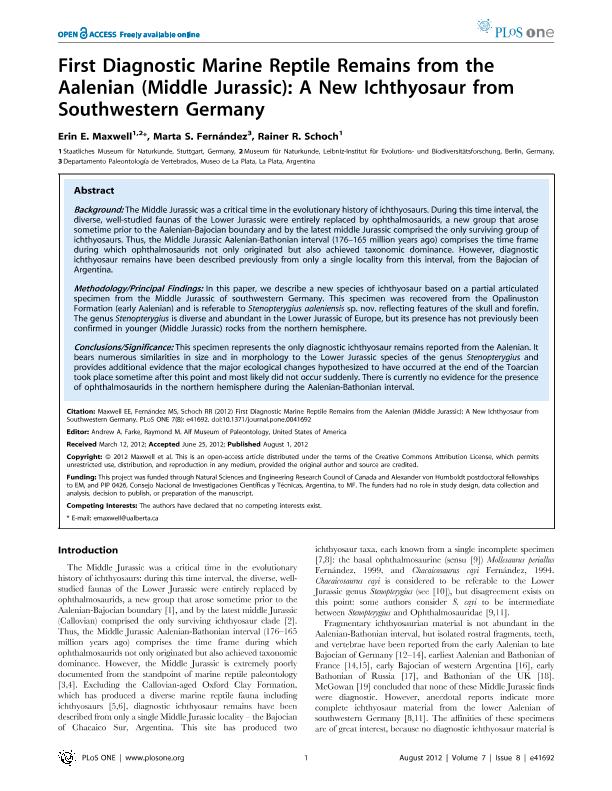Mostrar el registro sencillo del ítem
dc.contributor.author
Maxwell, Erin E.
dc.contributor.author
Fernández, Marta Susana

dc.contributor.author
Schoch, Rainer

dc.date.available
2023-05-11T11:21:10Z
dc.date.issued
2012-08
dc.identifier.citation
Maxwell, Erin E.; Fernández, Marta Susana; Schoch, Rainer; First Diagnostic Marine Reptile Remains from the Aalenian (Middle Jurassic): a New Ichthyosaur from Southwestern Germany; Public Library of Science; Plos One; 7; 8-2012; 41692-41692
dc.identifier.issn
1932-6203
dc.identifier.uri
http://hdl.handle.net/11336/197116
dc.description.abstract
Background: The Middle Jurassic was a critical time in the evolutionary history of ichthyosaurs. During this time interval, the diverse, well-studied faunas of the Lower Jurassic were entirely replaced by ophthalmosaurids, a new group that arose sometime prior to the Aalenian-Bajocian boundary, and by the latest middle Jurassic comprised the only surviving group of ichthyosaurs. Thus, the Middle Jurassic Aalenian-Bathonian interval (176–165 million years ago) comprises the time frame during which ophthalmosaurids not only originated but also achieved taxonomic dominance. However, diagnostic ichthyosaur remains have been described previously from only a single locality from this interval, from the Bajocian of Argentina. Methodology/Principal Findings: In this paper, we describe a new species of ichthyosaur, based on a partial articulated specimen from the Middle Jurassic of southwestern Germany. This specimen was recovered from the Opalinuston Formation (early Aalenian) and is referable to Stenopterygius aaleniensis sp. nov. based on features of the skull and forefin. The genus Stenopterygius is diverse and abundant in the Lower Jurassic of Europe, but its presence has not previously been confirmed in younger (Middle Jurassic) rocks from the northern hemisphere. Conclusions/Significance: This specimen represents the only diagnostic ichthyosaur remains reported from the Aalenian. It bears numerous similarities in size and in morphology to the Lower Jurassic species of the genus Stenopterygius and provides additional evidence that the major ecological changes hypothesized to have occurred at the end of the Toarcian took place sometime after this point and most likely did not occur suddenly. There is currently no evidence for the presence of ophthalmosaurids in the northern hemisphere during the Aalenian-Bathonian interval.
dc.format
application/pdf
dc.language.iso
eng
dc.publisher
Public Library of Science

dc.rights
info:eu-repo/semantics/openAccess
dc.rights.uri
https://creativecommons.org/licenses/by-nc-sa/2.5/ar/
dc.subject
Ichthyosaur
dc.subject
Aalenian
dc.subject
Middle Jurassic
dc.subject
Germany
dc.subject.classification
Paleontología

dc.subject.classification
Ciencias de la Tierra y relacionadas con el Medio Ambiente

dc.subject.classification
CIENCIAS NATURALES Y EXACTAS

dc.title
First Diagnostic Marine Reptile Remains from the Aalenian (Middle Jurassic): a New Ichthyosaur from Southwestern Germany
dc.type
info:eu-repo/semantics/article
dc.type
info:ar-repo/semantics/artículo
dc.type
info:eu-repo/semantics/publishedVersion
dc.date.updated
2023-05-08T17:27:51Z
dc.journal.volume
7
dc.journal.pagination
41692-41692
dc.journal.pais
Estados Unidos

dc.description.fil
Fil: Maxwell, Erin E.. Staatlisches Museum Naturkunde, Stuttgart; Alemania
dc.description.fil
Fil: Fernández, Marta Susana. Universidad Nacional de La Plata. Facultad de Ciencias Naturales y Museo. Departamento Científico de Paleontología de Vertebrados; Argentina. Consejo Nacional de Investigaciones Científicas y Técnicas. Centro Científico Tecnológico Conicet - La Plata; Argentina
dc.description.fil
Fil: Schoch, Rainer. Staatlisches Museum Naturkunde, Stuttgart; Alemania
dc.journal.title
Plos One

dc.relation.alternativeid
info:eu-repo/semantics/altIdentifier/url/https://journals.plos.org/plosone/article?id=10.1371/journal.pone.0041692
dc.relation.alternativeid
info:eu-repo/semantics/altIdentifier/doi/http://dx.doi.org/10.1371/journal.pone.0041692
Archivos asociados
